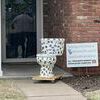Expansive mental health facility moving to hospital grounds
.jpg)
Grand Mental Health (formerly Grand Lake) is making some big changes in Blackwell.
On Thursday, work began on the old building located on the north side of the Stillwater Medical- Blackwell campus, transforming the long-vacant facility into a new state-of-the-art mental health and wellness facility.
Currently, Grand Mental Health is operating out of the former Red Cross building on 13th and Ferguson, serving nearly 200 people in the Blackwell area.
This new facility will allow more diverse treatment methods, and give the mental health organization the space to serve even more people in need.
Josh Cantwell, Chief Operating Officer for Grand Mental Health, spoke optimistically on Monday morning regarding the new facility.
“We have been working very closely with the City of Blackwell on acquiring this new facility, and they have been so kind to us- City Manager Jerry Wieland, City Attorney Bryce Kennedy- they have been so gracious the entire time. We have such a good working relationship with the City.”
Cantwell continued:
“We have been occupying that space across from the hospital for a couple of years now, and the time came to expand.”
“The space on the hospital grounds became available as we were discussing an expansion- an expansion of our service array. We’re currently operating our out-patient facility Monday through Friday and we know, of course, that mental health needs don’t just stop at 5 p.m on Friday and start back up at 8 a.m. on Monday. So, it was always important to us to get a crisis center in Blackwell, and this will allow us to do that.”
The new facility will be an Urgent Recovery Center, Structured Crisis Center, and Family Assessment Center, adding an additional 40 staff members to the 12 full-time healthcare providers currently working at Grand’s Blackwell site.
Cantwell noted that while the architectural plans are being drafted, the site will be redone from quite literally the ground up to provide mental health assistance and create an aesthetically pleasing space so that treatment will begin immediately from even just approaching the new site.
“What we’re going to do is bump the ceiling up in there, utilizing the existing structure, and building outwards as well. It will allows us to make the best possible use of that space in all aspects, ”Cantwell said.
“We’re looking at aesthetic and therapeutic value with our new site so that the minute someone pulls up, that treatment can, in effect, start immediately. It will be a calming site, allowing them to pull up and immediately feel the welcoming environment- tranquil, nice smelling, calming.”
The architect behind the project is Subha Sridharan with Forest for the Trees, who Cantwell praised, noting that Sridharan is working with them from a conceptual level to understand the care provided and the needs of the patients and working that into the architecture.
The firm, based out of Tulsa, have been responsible for most of Oklahoma State University’s renovations and expansions, retail locations throughout Oklahoma, and luxury housings in New York City and Tulsa.
Cantwell continued:
“It will be continual progress from here on out.”
All things considered; Cantwell estimated the site to be roughly a 24-month project.
“There’s no reason we can’t be done in 2 years,” he said.
“The new site will provide a Psychiatric Urgent care as well as the structured crisis center. People can come in for our services 24 hours a day, 7 days a week. Law enforcement will also have a place to drop people off at any time that need services. People that are a danger to themselves or others will also have extended care opportunities. Medication management, therapy, all of that. And it can be a few hours of treatment or a few days.”
Patients will also be given iPad devices equipped with MyCare, an app that is available 24/7 to help with crisis events.
“That app allows services from anywhere. We will also have 24-hour access to families that are in crisis. And instead of going to an emergency room or calling the police, they can come in to have their needs met.”
To say Cantwell and the administration for Grand are enthusiastic about what they do is a relative understatement.
“There’s no shortage of people in need, we want to create an atmosphere where people have unbridled access to our services,” he said.
Currently, law enforcement throughout Grand’s 12 counties have iPad’s equipped with technology to allow those in need to contact Grand’s mental health capabilities at any time.
“We have 12,500 iPads in people’s homes now, for access all the time, so they don’t have to go to that…next level of need. If those mental health needs escalate, we don’t want that. We want them to have us with them 24 hours a day.”
“If we don’t grow, if we don’t expand, people won’t have that access we want them to have to our resources,” Cantwell said.
“We are trying to provide innovative ways for people to have services sooner than rather than later, so they don’t have to elevate to more ‘crisis-based’ needs.”
"We want to prevent people from going to that higher level of care like inpatient hospitalization whenever possible. Though there is a use for that level of care, we believe that we can handle most situations in a much less restrictive environment, keeping people close to home often on a voluntary status."
“Our sites are less restrictive and, importantly, far less expensive,” he noted.
Grand Mental Health is partially funded by the Oklahoma Department of Mental Health and Substance Abuse Services.
Cantwell concluded, stating:
“Blackwell has embraced us since the beginning, and we look forward to continuing to repay that kindness and help as many people as possible.”
Please support The Blackwell Journal-Tribune by subscribing today!
